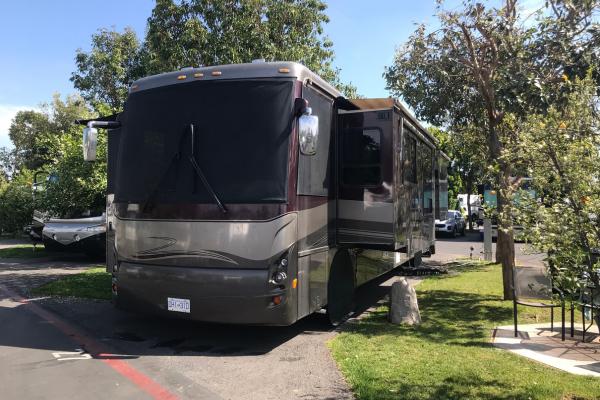
With so many options, it isn’t easy deciding which type of RV to purchase. One of the key decisions is whether to buy a motorized or a towable RV. Within each of those overall types, several categories exist. To help RV Curious readers weigh the possibilities, I’ve decided to delve into each type and outline the features to assist those interested in purchasing one and joining the RV family.
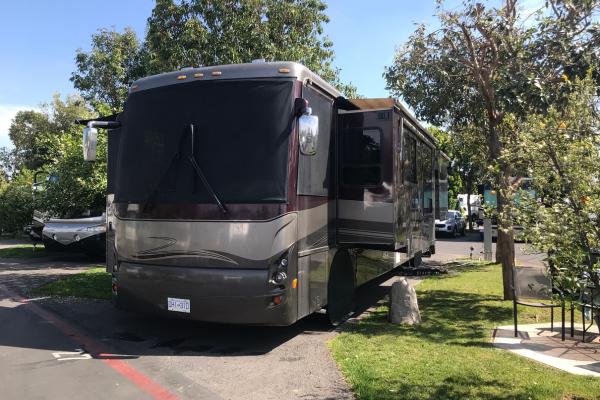
About Class A Motorhomes
Let’s start with motorized RVs and first focus on Class A motorhomes. In general, Class As are available in lengths ranging from about 22 feet to 45 feet. They are built on specially designed chassis powered by either a gasoline or a diesel engine. New Class As can vary in price from approximately $140,000 to several million dollars.
Dealers use the manufacturer’s suggested retail price (MSRP) as a pricing guideline. Even though the MSRP is one price, you’ll often find dealers listing new Class A motorhomes for less.
Diesel Versus Gas
It is important to consider the pros and cons of a diesel-powered motorhome versus a gas-powered unit. One key difference is that diesel motorhomes are significantly more expensive than gas coaches when it comes to the initial purchase and to service.
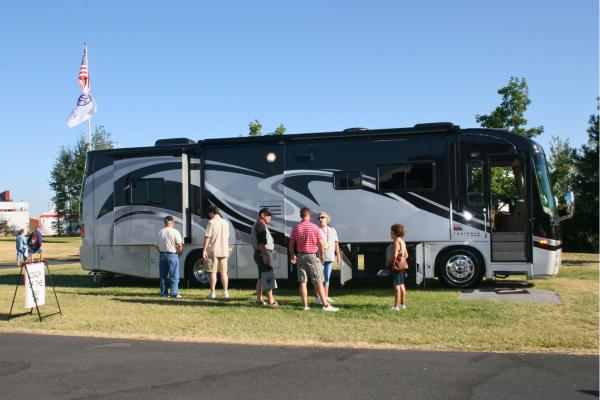
Maintenance and Repairs
Diesel RVs require service and repair by technicians at heavy-duty mechanical shops. While the labor rate tends to be higher for diesel mechanics versus those who work on gas-powered units, diesel vehicles tend to be more reliable than their gas counterparts. Therefore, the higher labor rate generally will be offset by the need for fewer service visits.
Another thing to consider is the availability of mechanics able to work on Class A coaches. With gas-powered motorhomes, it may be difficult to find a shop that can handle them. For instance, if you have a Ford chassis, you might assume you can just take your motorhome to a Ford dealership for service. However, many Ford dealerships don’t have the shop capacity to service these RVs. Ford truck shops might, but often they do not, either.
You may find that you must take your gas-powered motorhome to a heavy-duty mechanic shop, which results in higher labor rates. Also, when you are on the road, convenience is key, and heavy-duty shops, especially dealerships, tend to have much longer operating hours. It is common to see truck shops open until midnight.
Quality, Wear, and Tear
Diesel units have a longer life expectancy than gas units. Therefore, the expected length of ownership may be a consideration when determining whether to buy a gas or a diesel motorhome. Generally speaking, if you are thinking of purchasing a Class A motorhome, put some serious thought into forking over the extra dollars for a diesel unit. In my opinion, you won’t regret it. Note that diesel motorhomes tend to be higher-end units. Luxury RVs are always diesel-powered. Higher-grade construction and amenities such as full-body exterior paint (versus decals), real wood cabinetry, upgraded flooring, etc., add to the expense.

Driving
Class A units can be daunting to drive and maneuver, but arguably no more so than towing a trailer. With practice and patience, however, you will find that driving them isn’t as challenging as you might imagine. Here are a few key considerations, though.
Note that most diesel units incorporate air brakes, and some jurisdictions require an air brake endorsement on your driver’s license. Contact your local licensing authority for information.
Class A units can’t be slipped into a parking stall at the local mall (feel free to take up multiple spots in a quiet corner of the parking lot), and I don’t recommend driving them in a city center without a lot of practice. When you need to stop en route, visually triage the area to find a suitable place to park the RV, and make sure you can easily pull out to get back on the road.
On the flip side, driving a Class A RV on highways and major roads affords great visibility as compared with driving a passenger vehicle. Just be aware of the clearances around your RV and you will be fine.
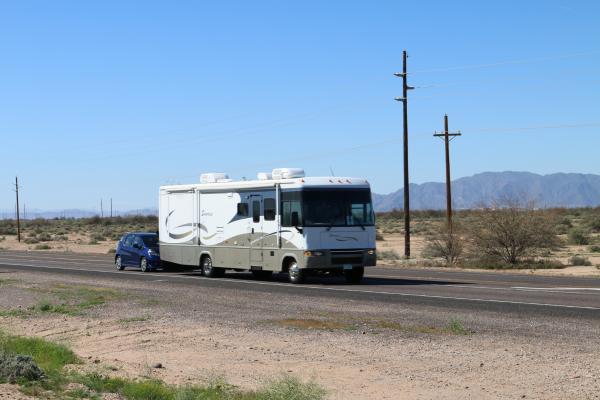
Many Class A owners either tow a car behind the motorhome for commuting or rent a vehicle when they arrive at their destination. Ride-share companies such as Uber and Lyft also are options for transportation once you set up the motorhome in camp.
Increase passing distances and know the dimensions of your unit, especially the overall height, including rooftop equipment such as air conditioners. You shouldn’t encounter issues on major roads, but be aware of the clearances of bridges, tunnels, overpasses, and the like. Most will be high enough for your motorhome to pass underneath, but be especially careful on secondary roads.
Given enough practice, any experienced driver can handle a Class A motorhome. Motorhomes have very good mirrors, and newer ones often incorporate multiple cameras (rearview and side) to assist. Some new RVers may feel more comfortable taking a driving class, such as those offered by RV driving schools around the country.
Want to take an RV driving class? RV Driving School partners with FMCA during its international conventions and expos to make driving classes convenient and easy to get the necessary skills to feel more comfortable driving or towing.
Floor Plans
Class A motorhomes will usually incorporate at least one slideout — rooms that extend outward and significantly increase the living space inside. Some have as many as five slideouts. The slideouts generally use hydraulic or electronic technology to extend and retract and can be operated via a switch or an onboard electrical control system.
Due to their large size, Class A units can accommodate all the amenities, such as a washer/dryer, a fireplace, multiple bathrooms, toy hauler space, etc.
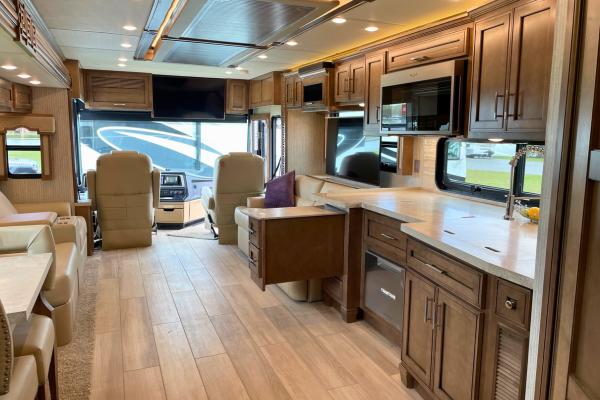
One benefit of a motorhome versus a towable RV is that in a motorhome, you can quickly move from the cockpit to other parts of the RV without going outside. This can come in handy when you’re traveling and want to make a stop for a bathroom break or to prep a quick sandwich for lunch. Note, however, that some floor plans in RVs restrict access to the refrigerator and/or bathroom when slideouts are retracted, so if that’s important to you, you’ll want to look for that.
Next up, I will discuss Class C and Super C motorhomes.
Want to see more articles like this one? Check out:
- Try Before You Buy: Why Renting an RV Makes Sense
- Understanding RV Travel Trailers: Benefits, Drawbacks, and Key Features
- Putting the RV to Bed
 Steve Froese is a longtime member of FMCA, a nonprofit organization for owners of recreational vehicles, and writes the “Tech Talk” column for Family RVing magazine. He is an experienced RV owner and a certified RV technician in both the United States and Canada. Steve is also a licensed professional engineer in British Columbia and a busy professional musician. Steve Froese is a longtime member of FMCA, a nonprofit organization for owners of recreational vehicles, and writes the “Tech Talk” column for Family RVing magazine. He is an experienced RV owner and a certified RV technician in both the United States and Canada. Steve is also a licensed professional engineer in British Columbia and a busy professional musician. |


Leave a Reply